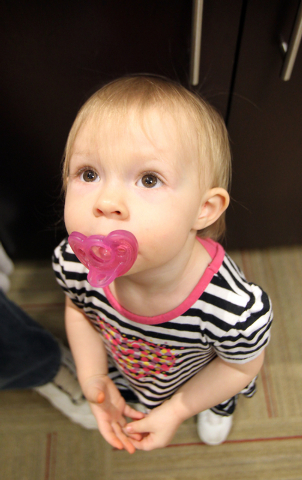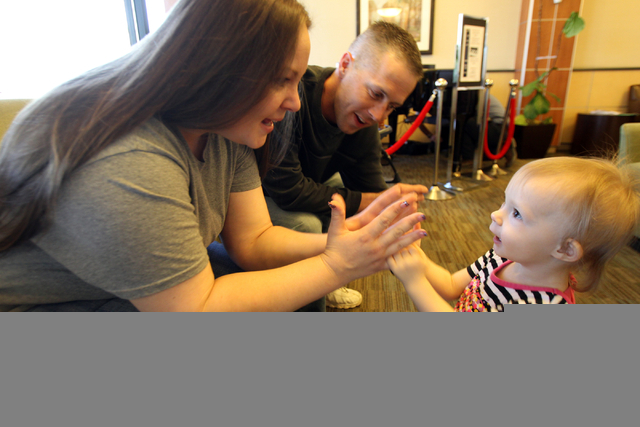Arizona couple forever thankful toddler daughter survived accident
It’s awful to think about.
So awful.
Shelli and Jerimey Dykens have had nightmares about it.
Still do.
A coffin holding their beautiful 18-month-old daughter Savannah wouldn’t have been much longer than 3 feet.
They know that tiny, gorgeous Savannah wouldn’t have been able to relate the terror and pain she suffered, that she wouldn’t have been able to protest that she was denied the most fundamental right of all: the right to life.
All because of them — her loving, caring parents, whose faces contort with pain as they remember how their family sport utility vehicle backed over their baby girl.
She was flown by emergency personnel from Kingman, Ariz., to Sunrise Hospital and Medical Center in Las Vegas. If Savannah hadn’t miraculously survived, Shelli and Jerimey Dykens surely would have carried her pain, and their own, until the day they died.
Would they have gone mad? They don’t know, don’t want to know.
Had Savannah died, when would they have counted all the years of productive life stolen from their little girl? Every day? On her birthday? In the morning? At night? “I can’t think about it,” Shelli Dykens says. “It drives me crazy.”
Could they have gone forward amid their shattered dreams, the promise of what might have been, what should have been?
“I don’t know if we could have handled it,” Jerimey Dykens agrees. “I’m just glad we don’t have to find out.”
Shelli and Jerimey Dykens know they don’t want another child backed over, don’t want other parents enduring the gut-wrenching agony of knowing they harmed their own flesh and blood.
So they sit in Sunrise Hospital and say they want what happened in their family to be used as a teaching tool, that even though the federal government requires car manufacturers to install backup cameras in most new vehicles by May 2018, they believe people should install backup cameras on their own cars today.
And they pray their tragedy might help cut down on the more than 200 deaths, and more than 15,000 injuries that occur each year in the United States as a result of back-over accidents.
Most of the deaths and injuries occur, the federal Transportation Department says, among the country’s most vulnerable: children and seniors.
“I don’t want another baby to be hurt,” says Jerimey Dykens, a training sergeant at the Arizona state prison in Kingman and a combat veteran of Iraq and Afghanistan. “And I don’t want other parents to go through this. It is hell on earth.”
It was nearly 5 o’clock on the afternoon of April 27 when the Dykens — they have another daughter, 10-year-old Alexis — came to realize that just letting your guard down for a few seconds leaves the door open for catastrophe.
“We always made safety a priority,” Jerimey Dykens says.
Shelli Dykens, a Laughlin casino waitress who drives a Hyundai Tucson, had decided to make a quick trip to the convenience store a few blocks from her Kingman home. When her husband, who was playing with Savannah inside the house, realized his wife was leaving, he ran out the front door and asked her to pick up some smokes.
“We’re literally talking 10 seconds, no more,” Jerimey Dykens says.
So the couple who put up a safety fence even before installing a pool, who had locks on doors and cabinets so Savannah couldn’t go outside or get into dangerous cleaning products, who didn’t allow the driveway to be a playground, who walked behind their cars before they got in them, who warned kids on bikes and scooters that they were coming out, who looked over their shoulders and in both mirrors before backing up, made a 10-second mistake.
“I came back in the house and didn’t see Savannah,” Jerimey Dykens recalls. “Then I heard my wife hysterically screaming my name. And just like that I knew what happened. She had followed me out and I didn’t know it. I knew the baby was hit. I don’t know how I knew that. I just knew.”
His wife’s scream came after she “felt a bump and Savannah made a strange noise. … I started screaming for Jerimey immediately … when I got out Savannah was on all fours and she looked like she was trying, but she couldn’t scream. She was crying and reaching out to me but I was afraid to touch her for fear she had really broken something and I’d make it worse.”
With his wife calling 911, Jerimey Dykens ran to his daughter who was near the left rear tire. “She let out a blood-curdling scream as she reached for me,” says Dykens, who had been trained as an emergency medical technician. “I knew it could be dangerous for me to pick her up before first responders arrived, but the father in me won out.”
When he picked Savannah up, he noticed that she drew her legs up, as though trying to protect her abdominal area.
An ambulance took the child to a Kingman hospital. Hours of tests showed two fractures in her pelvis, though there were some strange results on blood tests. Not wanting to miss something, doctors decided to fly Savannah by helicopter to the larger and more medically comprehensive Sunrise Hospital.
This time, days of tests showed only the two fractures, which were so perfectly aligned that no surgery was required. Still, Savannah was in too much pain to walk or crawl.
Three days after Savannah entered Sunrise, she was released. Doctors told the parents that it might be two or three weeks before she walked.
“They said she’d do it when she was ready and not before,” Shelli Dykens recalls.
Four days after she was flown to Sunrise, Savannah started crawling. A day later, she began to walk.
“We couldn’t believe it,” Shelli Dykens says. “She hasn’t stopped walking since.”
Dr. David Stewart, an orthopedic surgeon who worked on Savannah’s case, is also amazed by her recovery. That her bones were still developing, he says, may have meant she could absorb more trauma.
“She’s so very fortunate,” he says. “Often children don’t turn out this well after such a tragic accident. The fractures are perfectly aligned and healing so I don’t even have to see her anymore.”
What is generally fatal, he says, is a child who suffers a brain injury. Back-overs that involve the spine cause paralysis.
“She is very lucky,” the doctor says. “I can’t stress that enough. This isn’t how most of these turn out.”
On this day, just before the follow-up exam with Stewart where he released her from his care, Savannah seems to know how lucky she is. She celebrates her good fortune by dancing and cooing in the Sunrise Hospital lobby. Visitors smile and stand and watch.
Jerimey Dykens, who’s now installed rear backup cameras in both of the family vehicles for less than $300, watches his giggling daughter and shakes his head.
“It’s still hard to believe that what happened happened. We might have to go to counseling to deal with this. It shakes you up. You don’t want to go through this, believe me. And we were lucky, our daughter lived.
“I talked with some guy whose kids didn’t make it and they say they’ll never be the same. Man, I hope people can learn from us.”
Contact reporter Paul Harasim at pharasim@reviewjournal.com or 702-387-2908.


































